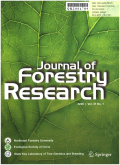- 钛学术文献服务平台 \
- 学术期刊 \
- 农业科学期刊 \
- 林业期刊 \
- 林业研究(英文版)期刊 \
Nitrogen availability regulates deep soil priming effect by changing microbial metabolic efficiency in a subtropical forest
Nitrogen availability regulates deep soil priming effect by changing microbial metabolic efficiency in a subtropical forest
基本信息来源于合作网站,原文需代理用户跳转至来源网站获取
摘要:
In terrestrial ecosystems,deep soils(below 30 cm)are major organic carbon(C)pools.The labile car-bon input could alter soil organic carbon(SOC)mineraliza-tion,resulting in priming effect(PE),which could be modi-fied by nitrogen(N)availability,however,the underlying mechanism is unclear for deep soils,which complicates the prediction of deep soil C cycling in response to N deposi-tion.A series of N applications with 13C labeled glucose was set to investigate the effect of labile C and N on deep SOC mineralization.Microbial biomass,functional community,metabolic efficiency and enzyme activities were examined for their effects on SOC mineralization and PE.During incubation,glucose addition promoted SOC mineralization,resulting in positive PE.The magnitude of PE decreased significantly with increasing N.The N-regulated PE was not dependent on extracellular enzyme activities but was posi-tively correlated with carbon use efficiency and negatively with metabolic quotient.Higher N levels resulted in higher microbial biomass and SOC-derived microbial biomass than lower N levels.These results suggest that the decline in the PE under high N availability was mainly controlled by higher microbial metabolic efficiency which allocated more C for growth.Structural equation modelling also revealed that microbial metabolic efficiency rather than enzyme activities was the main factor regulating the PE.The nega-tive effect of additional N suggests that future N deposition could promote soil C sequestration.

推荐文章
Microaerobic iron oxidation and carbon assimilation and associated microbial community in paddy soil
Paddy soil
Microaerobic Fe(Ⅱ)-oxidation
CO2 assimilation
SIP
In-situ nitrogen fate in the vadose zone of different soil types and its implications for groundwate
Vadose zone
Silty-loam
Silty-clay-loam
Nitrogen transformation
Groundwater vulnerability
Stable isotopes
Forest carbon storage in Guizhou Province based on field measurement dataset
Forest carbon storage
Field measurement dataset
Karst landform
Spatial analysis of carbon storage density of mid-subtropical forests using geostatistics: a case st
Carbon storage density
Geostatistics
Mid-subtropical forests
Spatial autocorrelation
Spatial heterogeneity
内容分析
关键词云
关键词热度
相关文献总数
(/次)
(/年)
引文网络
引文网络
二级参考文献 (0)
共引文献 (0)
参考文献 (31)
节点文献
引证文献 (0)
同被引文献 (0)
二级引证文献 (0)
1982(1)
- 参考文献(1)
- 二级参考文献(0)
1994(1)
- 参考文献(1)
- 二级参考文献(0)
2000(1)
- 参考文献(1)
- 二级参考文献(0)
2002(1)
- 参考文献(1)
- 二级参考文献(0)
2003(1)
- 参考文献(1)
- 二级参考文献(0)
2004(1)
- 参考文献(1)
- 二级参考文献(0)
2006(3)
- 参考文献(3)
- 二级参考文献(0)
2007(2)
- 参考文献(2)
- 二级参考文献(0)
2008(1)
- 参考文献(1)
- 二级参考文献(0)
2010(3)
- 参考文献(3)
- 二级参考文献(0)
2011(2)
- 参考文献(2)
- 二级参考文献(0)
2012(1)
- 参考文献(1)
- 二级参考文献(0)
2014(2)
- 参考文献(2)
- 二级参考文献(0)
2015(2)
- 参考文献(2)
- 二级参考文献(0)
2016(3)
- 参考文献(3)
- 二级参考文献(0)
2017(1)
- 参考文献(1)
- 二级参考文献(0)
2018(3)
- 参考文献(3)
- 二级参考文献(0)
2019(2)
- 参考文献(2)
- 二级参考文献(0)
2021(0)
- 参考文献(0)
- 二级参考文献(0)
- 引证文献(0)
- 二级引证文献(0)
引文网络交叉学科
相关学者/机构
期刊影响力
林业研究(英文版)
主办单位:
东北林业大学
中国生态学学会
出版周期:
双月刊
ISSN:
1007-662X
CN:
23-1409/S
开本:
大16开
出版地:
哈尔滨市动力区和兴路26号(林大123信箱)
邮发代号:
创刊时间:
1990
语种:
eng
出版文献量(篇)
2459
总下载数(次)
1
总被引数(次)
7852
期刊文献
相关文献
推荐文献
- 期刊分类
- 期刊(年)
- 期刊(期)
- 期刊推荐
林业研究(英文版)2022
林业研究(英文版)2021
林业研究(英文版)2020
林业研究(英文版)2019
林业研究(英文版)2018
林业研究(英文版)2017
林业研究(英文版)2016
林业研究(英文版)2015
林业研究(英文版)2014
林业研究(英文版)2013
林业研究(英文版)2012
林业研究(英文版)2011
林业研究(英文版)2010
林业研究(英文版)2009
林业研究(英文版)2008
林业研究(英文版)2007
林业研究(英文版)2006
林业研究(英文版)2005
林业研究(英文版)2004
林业研究(英文版)2003
林业研究(英文版)2002
林业研究(英文版)2001
林业研究(英文版)2000
林业研究(英文版)1999

 免费查重
免费查重










